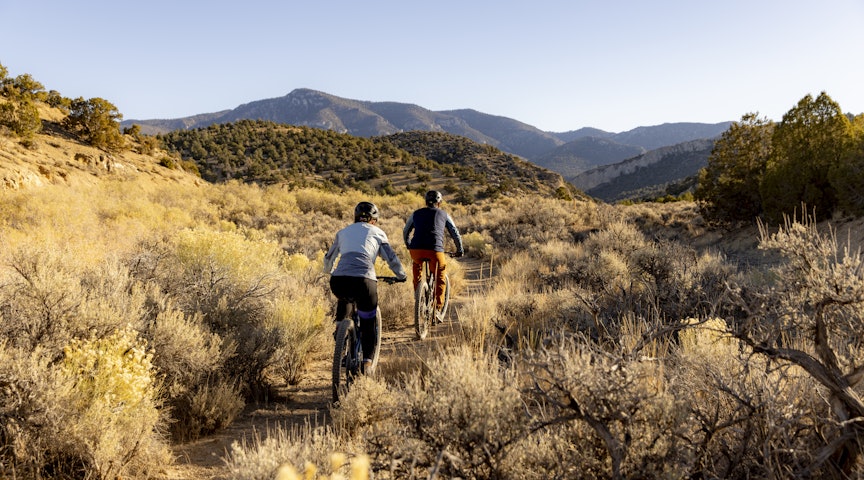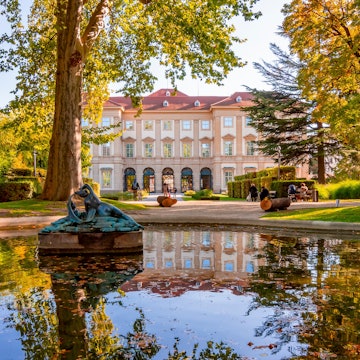

A striking mural at the Chamizal National Memorial monument © Alamy Stock Photo
Ever since Spanish explorers traveling northbound named the pass between the two mountains rising out of the desert El Paso del Norte in the late 1500s, the area has been a hub of crisscrossing cultures.
Today El Paso stretches along the Texas–Mexico border a stone’s throw from its sister city Juarez, Mexico, which together form the largest bi-national metroplex in the world. El Paso’s rich culture is a blend of Old West lore, Native American heritage, Spanish colonialism, Mexican culture, Texas bravado and the desert landscape it sits upon. Its museums reflect this diverse range of influence. All El Paso museums are free to the public, making a day of museum hopping an affordable option for everyone.
Centennial Museum and Chihuahuan Desert Gardens: best for plant lovers
The El Paso Centennial Museum was built during the 1936 Texas Centennial making it the oldest museum in El Paso. Permanent exhibits focus on the natural and cultural history of the largest desert in North America – the Chihuahuan Desert region. While the cultural exhibits focus on the indigenous, colonial, pre-urban and folk cultures of the border region, the natural exhibits focus on the native plants that make up the desert.
In 1999, the museum expanded to include gardens. Today it is certified as a Texas Wildscape site with more than 800 species of plants that are native or adapted to the Chihuahuan Desert. The gardens boast one of the largest captive assemblages of Chihuahuan Desert flora in the world. While wandering through the museum’s themed gardens, visitors learn about the use of native plants in landscaping, water conservation and restoring healthy ecosystems.

Chamizal National Memorial Museum: best for picnickers
Not many people outside of El Paso realize that the United States and Mexico were in a century-long battle over a piece of land. The Rio Grande river, which long acted as the natural border between the countries, was rerouted in 1864 after a massive flood conceded 600 acres of Mexican land to El Paso.
Mexico disputed the new position of the international boundary for almost 100 years until President Kennedy negotiated the Chamizal Treaty to return the land back to its rightful owners. The Chamizal National Memorial commemorates this milestone in diplomatic relations. The onsite museum details the history of the US–Mexico border starting with the Indigenous people who called the banks of the Rio Grande home for generations, leading to the Mexican–American War of the 1840s, to the negotiated boundary that would separate the two nations, through the century of conflict after the flood and finally to the treaty that peacefully ended the conflict.
The museum sits on 55-acres of gently rolling hills. The parkland is full of trees to provide shade on hot days, has access to restrooms, and provides picnic areas with tables and grills, making it the perfect spot to have a picnic after an afternoon at the museum.
Old El Paso County Jail Museum: best place for wild west enthusiasts
The infamous gunslinger Billy the Kid remains one of the most legendary outlaws of the Old West. What started out in 1850 as a two-room adobe building that served as the county’s official courtroom and jail, became a location of legend when Billy the Kid posed as a Texas Ranger to break into the jail and release fellow outlaw Melquiades Segura. According to the Texas Historical Commission plaque, Segura was the only prisoner to ever escape from the jail.
Today the small museum gives visitors a glimpse of what it was like to be on both sides of the jail door during the late 1800s. Maps of Texas’ early days along with Billy the Kid Wanted posters hang on the walls overlooking a wooden table and chairs set up with cards and a bottle of whiskey to entertain jailers while they stood guard. Visitors can enter the two original jails cells. The local historic group Los Pistoleros de San Elizario reenacts the Billy the Kid breakout saga every third Sunday of the month from March to November.

Historic Mission Trail: best place for those who remember the Alamo
Despite popular belief, the Alamo isn’t the only mission of significance in Texas. The nine-mile Historic Mission Trail stretching along El Paso County’s east side gives visitors a chance to walk through three of the oldest churches in the United States. The Ysleta Mission, Socorro Mission and San Elizario Chapel each embody a piece of Texas history, religious significance and architectural beauty.
The Ysleta Mission is the oldest active mission in the state and was built by the Tigua people in 1682. While the building has undergone several changes due to fires and floods, it still remains the oldest active parish in Texas.
All three stand along the El Paso Mission Trail as enduring symbols of the long, rich history Spain, Mexico and the United States had on the region. The trail is a tiny portion of the historic Camino Real that once linked Mexico City with Santa Fe. In addition to the missions, cultural centers, art galleries, restaurants, historic landmarks and a local brewery can be found along the mission trail.

El Paso Museum of History: best interactive museum
A giant 3D touch-sensitive digital wall sits outside the El Paso Museum of History allowing visitors to explore the city’s 400 years of history with the touch of a finger. The five panels of touchscreens totaling 35-feet in length make up the only digital wall of its kind in the United States and one of four in the world. Loaded with historic and modern-day photography and video, the interactive program portrays scenes from El Paso’s past and present. Visitors can click on each new city scene to reveal more information like names, dates and historical context. Users can browse topics by time period, location or categories such as celebration, education and faith.
Inside the museum, exhibits representing the rich history of the borderlands are presented throughout five galleries. The museum’s permanent exhibition "Changing Pass: People, Land & Memory'' covers El Paso’s 1000 years of history beginning with early Indigenous settlers and concludes with World War II and the Bracero Program in the 20th century.
You might also like:
12 best beaches in Texas for family fun, wildlife spotting or solitary walks
The best things to do in Texas, from barbecues to stunning views
Toll-free Texas: the best free things to do in the Lone Star State
Take your United States (USA) trip with Lonely Planet Journeys
Time to book that trip to United States (USA)
Lonely Planet Journeys takes you there with fully customizable trips to top destinations – all crafted by our local experts.























